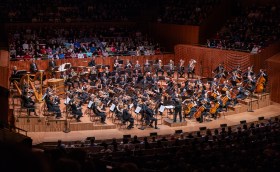Berlin-residing violinist and director Kolja Blacher led the MSO on Saturday the 28 November.
Berlin-residing violinist and director Kolja Blacher leading the MSO strings had me wondering whether the ensemble was running on a superior kind of high-octane fuel. The Orchestra’s strings sounded magnificent – rich, unified and full-bodied – in Elisabeth Murdoch Hall on Saturday evening, particular in the two works that Blacher led from the front desk: Bartok’s Divertimento for Strings (1939) and Tchaikovsky’s Serenade for Strings, Op 48. Blacher had the ability to infuse the entire ensemble with a powerful energy from the front desks to back. The Orchestra performed throughout with confidence, passion, and with a palpable sense of sheer joy which was heart-warming to experience.
The concert opened with the thumping folk rhythms of Bartók’s popular Divertimento for Strings, composed in just over two weeks, a commission from Paul Sacher for the Basle Chamber Orchestra. The opening movement’s buoyancy (Allegro non troppo) masks the reality that the world was soon to be at war so that the composer needed to emigrate to the United States from his beloved homeland, Hungary. The ensemble soon divides into solo and ensemble groups (superbly delivered by the Orchestra’s front desks) in a manner which has been likened to the Baroque oppositions of tutti and concerto grosso. Premonitions of the building political turmoil in Europe are powerfully portrayed in the slow movement (Molto adagio) that starts from nothing and builds into a monstrous maniacal maelstrom; the agony of fragmented Hungarian folk melodies screaming like sirens overhead. The final movement (Allegro assai) has a balletic feel with the lead dancers telling a story surrounded by ensemble; we move through an expressive cadenza, a flippant pizzicato dance and finally return to the whirling, frenzied material of the opening. Blacher clearly understood the acoustic of the Elisabeth Murdoch Hall well, encouraging the entire ensemble to savour its absolute silence and ability to carry the slightest of dynamics such as at the beginning of the bleak second movement.
A less successful, but nonetheless astonishing accomplishment was Kolja Blacher performing Brahms’s Violin Concert in D, Op 77 as soloist as well as directing an expanded orchestra including woodwinds, brass and percussion. Blacher had no trouble with the technical challenges presented by this difficult work written for the virtuoso Joseph Joachim. Performing the work without a conductor had mixed success. On the one hand it turned the Concerto into a kind of large chamber music composition with particularly close intimacy between soloist and ensemble, such as in the second movement (Adagio) with the famous oboe solo played with total rapport and so beautifully by Jeffrey Crellin. On the down side there were some tardy entries and inaccurate chordal passages which were surely inevitable given that the soloist was often well and truly otherwise occupied. One should add that Blacher’s conducting style was not the clearest to discern, holding his priceless 1730 Tritton Stadivarius and bow precariously in his left hand while conducting broadly with his right arm. I wonder how many were as terrified as I that he would drop it. Michael Jackson dangling his infant son Blanket over the balcony of the Hotel Adlon in Berlin came disturbingly to mind.
After interval, Blacher led a stirring performance of Tchaikovsky’s Serenade for Strings. This was an artful performance of this very popular work, with a confident sense of the work’s architecture and full appreciation of its broad, balletic majesty. There were some less precise aspects to the second movement; the Orchestra seemed unsure how ‘Viennese’ the waltz should be in style. Throughout one could relish, indeed rejoice in sensitive, fine and very elegant playing, particularly, I must say, from the four double basses.
Rating: 4 stars out of 5
Melbourne Symphony Orchestra
Kolja Blacher, Violin/Director
Bartók Divertimento
Brahms Violin Concerto
Tchaikovsky Serenade for Strings
Melbourne Recital Centre Series
Elisabeth Murdoch Hall
Saturday, 28 November, 2015





